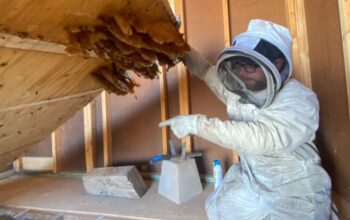Bed bug infestations have become a rising issue in Manchester apartment buildings and are making tenants, as well as property managers, sleepless nights. New Hampshire’s largest city has seen a surge in reports of infestations of the tiny blood sucking pests, especially in multi-unit housing complexes. With so many people living in shared walls and units constantly turning over, Manchester is a perfect place for the bugs to spread from unit to unit.
When these stubborn pests take hold of your property, property owners find themselves faced with angry tenants, expensive treatment costs, and possible legal issues. Suppose you are seeing signs of bed bug activity in your apartment building in Manchester. In that case, the best pest control should be called as soon as possible to stop a minor issue from becoming a building-wide nightmare.
6 Reasons Why Manchester Apartment Buildings Are Vulnerable to Bed Bug Infestation
- High Tenant Turnover in Manchester’s Rental Market
In Manchester, the rental market is so heated that vacancies come with built-in eviction days, especially downtown and around Southern New Hampshire University. Every new tenant could be moving in bed bugs with their furniture, bags, or clothes. New Manchester housing data indicates that apartment buildings have around 35% annual tenant turnover, resulting in many incidences of bed bug introductions at different times during the year.
- Shared Wall Construction
Many Manchester apartment buildings share walls, floors, and ceilings with their neighboring units. Bed bugs can readily travel through electrical outlets, plumbing penetrations, and tiny cracks in these common structures. After taking hold in one unit, they can quickly spread to neighboring flats.
- Limited Inspection Protocols
Unfortunately, most Manchester property management companies do not carry out complete bed bug inspections for new tenants and their properties. However, poorly screened infested furniture and personal items enter buildings every day.
- Delayed Reporting by Tenants
Some tenants in Manchester wait for 2-3 weeks before approaching the landlord after seeing a bed bug. Such a delay will allow the populations to become established and to spread to adjoining units, and treatment will then be much more difficult and expensive.
- Inadequate Preventive Measures
Sloppy sealing around pipes, electrical conduits, and baseboards, as well as common bed bug travel routes between units, are standard in older apartment buildings in Manchester’s Millyard District and nearby neighborhoods.
How to Keep Bed Bugs Away From Your Manchester Apartment Building?
- All new tenants will be required to have their furniture and other belongings inspected before they are allowed to move in
- Seal all gaps and cracks around baseboards, electrical sockets, and plumbing fixtures between units
- Use of door sweeps and weather stripping reduces spaces under doors and around windows
- Use Lease Agreements to Inform Tenants about Bed Bug Identification and Early Reporting Protocol
- Implement regular monitoring with bed bug interceptors and visual inspections in high-risk locations
- Establish a rapid response plan to treat suspected infestations within 24-48 hours of reports.
- Provide encasements for mattresses and box springs in furnished units as a prevention method
- Keep/register treatment logs to help identify patterns and avoid infestations on previously treated units
Why Professional Help Is Essential
In Manchester, apartment buildings infected with bed bug infestations need both specific instructions and commercial-grade remedies far beyond what property managers can accomplish alone. They are resistant to many of the off-the-shelf products, which is why it may be necessary to call in professionals to eliminate them.
Professional pest control services may face different challenges in multi-unit buildings and offer coordinated full-service cross-unit treatment. They also provide continual monitoring and follow-up services, which are essential to prevent re-infestation. Anchor Pest Services, for example, has decades of experience tackling the unique apartment building problems that plague Manchester, using integrated pest management strategies that focus on addressing immediate issues as well as long-term prevention.








